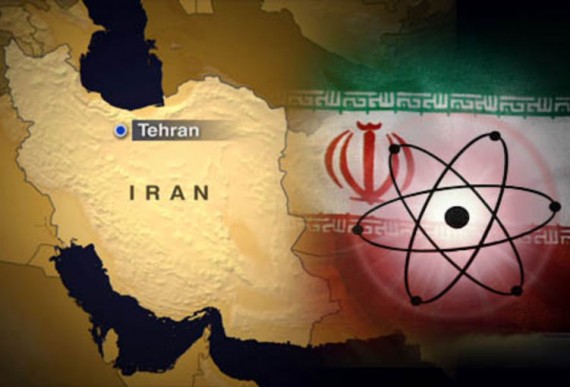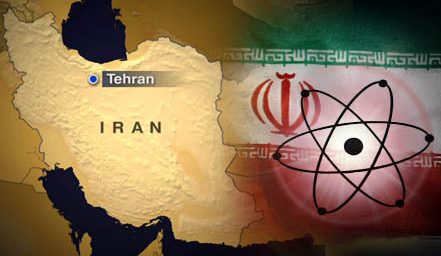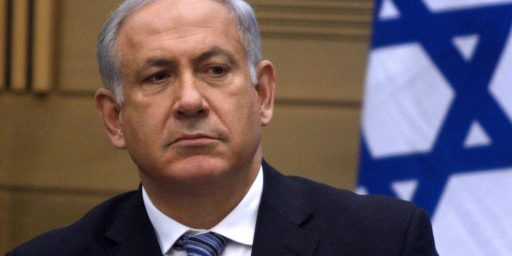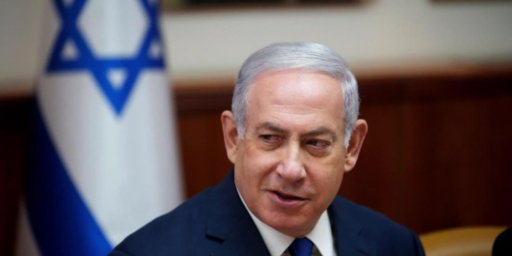Progress On Iran Nuclear Deal?
Signs of some progress in the talks over Iran's nuclear weapons program.
Secretary of State John Kerry is in Geneva today, joining European officials at the talks over Iran’s nuclear program amid reports that those talks may be close to a preliminary deal of some kind:
GENEVA — With expectations rising of an interim nuclear deal between the major powers and Iran, Secretary of State John Kerry cut short a Middle East trip and flew here on Friday to lead a concerted diplomatic push to close what he and allies described as important issues that still needed to be resolved.
An agreement, which would temporarily freeze at least some of Iran’s nuclear activities in return for unspecified but limited relief of the onerous sanctions that have severely hurt the Iranian economy, would be the first such pact in a decade with Iran. While the details, negotiated over the past two days here in Geneva, have been kept confidential, diplomats have said they would be aimed at starting a process that could gradually end Iran’s isolation in return for verifiable guarantees that its nuclear program is peaceful.
Iranian officials have effusively praised what they called progress in the negotiations, while Iran’s major adversaries, most notably Israel, have strongly criticized any agreement that does not entirely dismantle the country’s increasingly sophisticated nuclear enrichment capacity.
“There are important gaps that have to be closed,” Mr. Kerry said upon arrival in Geneva, seeking to temper rising expectations that a deal was close.
“I want to emphasize: there is not an agreement at this point in time,” Mr. Kerry told reporters at his hotel. “There are still some important issues on the table that are unresolved.”
But the mere fact of Mr. Kerry’s presence here suggested that the United States believed that a deal was within reach, and that it required higher-level participation to resolve the remaining issues.
Mr. Kerry was meeting on Friday evening with Iran’s foreign minister, Mohammad Javad Zarif, and the European Union’s foreign policy chief, Catherine Ashton, who oversees the multiparty negotiations.
Before that, he held separate meetings with Ms. Ashton; the French foreign minister, Laurent Fabius; and the British foreign secretary, William Hague, as the major powers coordinated their own bargaining positions. The German foreign minister, Guido Westerwelle, was also expected to join the push for an agreement.
The State Department’s spokeswoman, Jen Psaki, said in a statement that Mr. Kerry was in Geneva “in an effort to help narrow the differences in the negotiations.”
Mr. Fabius told reporters soon after arriving here on Friday that progress had been made during the latest round of talks with Iranian diplomats, which began on Thursday, but added, “Nothing is hard and fast yet.”
“We are working to reach an accord which completes the first step to respond to Iran’s nuclear program,” he said.
Not surprisingly, even these preliminary reports are leading to some not-so-diplomatic language from Israeli Prime Minister Benjamin Netenyahu:
“The deal that is being discussed in Geneva right now is a bad deal,” Mr. Netanyahu said. “Iran is not required to take apart even one centrifuge. But the international community is relieving sanctions on Iran for the first time after many years.”
“I urge Secretary Kerry not to rush to sign, to wait, to reconsider, to get a good deal,” Mr. Netanyahu added
Despite these comments, and similar signals from the Saudis that they too are not pleased with the idea with the idea of any deal that allows the Iranian program to continue, to the point that the KSA is talking to Pakistan about purchasing nuclear weapons of its own, the U.S. and its European allies continue to move forward toward a deal. Today in The Daily Beast, for example, Eli Lake and Josh Rogin report that the Obama Administration has been quietly lifting some of the more onerous sanctions on Iran, no doubt as an incentive for the Iranians:
The Obama administration began softening sanctions on Iran after the election of Iran’s new president in June, months before the current round of nuclear talks in Geneva or the historic phone call between the two leaders in September.
While those negotiations now appear on the verge of a breakthrough the key condition for Iran—relief from crippling sanctions—began quietly and modestly five months ago.
A review of Treasury Department notices reveals that the U.S. government has all but stopped the financial blacklisting of entities and people that help Iran evade international sanctions since the election of its president, Hassan Rouhani, in June.On Wednesday Obama said in an interview with NBC News the negotiations in Geneva “are not about easing sanctions.” “The negotiations taking place are about how Iran begins to meet its international obligations and provide assurances not just to us but to the entire world,” the president said.
But it has also long been Obama’s strategy to squeeze Iran’s economy until Iran would be willing to trade relief from sanctions for abandoning key elements of its nuclear program.
One way Obama has pressured Iran is through isolating the country’s banks from the global financial sector, the networks that make modern international commerce possible. This in turn has led Iran to seek out front companies and cutouts to conduct routine international business, such as selling its crude oil.
In this cat and mouse game, the Treasury Department in recent years has routinely designated new entities as violators of sanctions, forcing Iran to adjust in turn. In the six weeks prior to the Iranian elections in June, the Treasury Department issued seven notices of designations of sanctions violators that included more than 100 new people, companies, aircraft, and sea vessels.
Since June 14, however, when Rouhani was elected, the Treasury Department has only issued two designation notices that have identified six people and four companies as violating the Iran sanctions.
All of this, plus the talks, has moved forward despite the objections of the Israelis, and Jeffrey Goldberg explains why President Obama isn’t so concerned about the admonitions from Prime Minister Netenyahu:
The first reason is that U.S. President Barack Obama has him boxed in. Netanyahu can’t launch a unilateral strike on Iran now that the U.S. is actively negotiating with its leaders. That would just be outre. So Netanyahu is in a time-out of sorts — and therefore semi-marginalized.
The second reason is one Netanyahu, so far at least, has refused to comprehend. His unwillingness to permanently freeze settlement growth on the West Bank, to make the sort of grand gesture toward the Palestinians that would advance the peace process, has caused even those in Washington and Europe who are sympathetic to his stance on Iran to write him off as generally immovable and irrational.
Of course, the growth of settlements has nothing to do with Iran’s nuclear ambitions. Iran is not seeking the capability to build a nuclear weapon in order to bring about a two-state solution to the Israeli-Palestinian crisis.
Netanyahu argues that these are two separate issues, and he’s correct. Except that, in the world of international diplomacy, they are inextricably linked. The Obama administration hears Netanyahu’s demands for more action on Iran and tries — so far, fairly successfully — to meet that call for action. But when the Obama administration turns around and asks Netanyahu to make the sort of gestures that might advance the peace process, it more often than not gets stonewalled.
The irony of all of this, of course, is that Netenyahu is being just as stubborn on the settlements issue as he says the Iranians are being on the nuclear issue. The Iranians have said that there can’t be a deal on their nuclear program until there is talk about easing sanctions, which is what the talks in Geneva are all about. On the settlement issue, Netenyahu has adamantly refused even a temporary freeze on settlement growth in the West Bank even though it ought to be blindingly obvious to him that expanding settlements only makes the idea of an eventual two-state solution all the more difficult to pull off. Just as the Iranians may be about to find that being more flexible on their nuclear program would give them some relief from sanctions, Netenyahu’s agreement to freeze settlements would likely make the U.S. and the other nations part of the P+5 talks more solicitous of Israel’s concerns regarding the Iranian nuclear program.
In the end, though, I think the world is going to have to face up to a very simple fact. Absent some kind of massive political change, there is always going to be an Iranian nuclear program regardless of what the rest of the world thinks. The Iranians have made clear for a very long time that they want the ability to produce nuclear energy for the nation, and they also clearly want at least the suggestion that they have the ability to someday produce a nuclear device to be known to their potential adversaries. Given how the world has treated nations that either didn’t have nuclear weapons programs or gave them up (See e.g., Iraq and Libya) as compared to those who do have nuclear weapons programs (See e.g., Pakistan and North Korea), that is in some sense completely understandable. This will continue to be the case, and there will be very little the West can do about it absent a destructive, unnecessary war that ultimately would likely do little except set the program back by several years.
Obviously, these facts will have repercussions in the region. I honestly have no doubt that the Saudis would decide to acquire nuclear weapons of their own to counter an Iranian threat. Indeed, that would be an entirely rational response on their part. Similarly, the Israeli nuclear weapons arsenal stands as that nation’s deterrent against a nuclear attack. Say what you will about the Iranian regime, but I don’t count myself among those who believe that they’d be willing to commit national suicide for a chance to strike at Israel or Saudi Arabia. Indeed, as you look around the world, you see that nuclear deterrence actually does work whether it’s between the United States and the now defunct USSR, the USSR and China, or India and Pakistan. Indeed, one could make the argument that at some point over the past 60 years one or all of these conflicts could have erupted into a “hot” war had nuclear weapons not existed. In fact, India and Pakistan went to war several times over Kashmir before acquiring their respective nuclear arsenals. Now, there is an effective detente in the Himalayas that those arsenals have, no doubt, contributed to. Why should we not think that something similar would not happen in the Middle East?
All of that said, the prospect of progress in getting Iran to back off nuclear weapons development would be a helpful step forward. Nuclear proliferation in a powder keg region is not something to look forward to even if, in the end, it leads to some form of detente.







This could earn Mr. Obama a Nobel. The one he already got for no reason ten minutes after first being elected.
The Saudis want us to give them a boost in their endless sectarian struggle with Shia Islam. Netanyahu wants us to fight an aggressive war that could only benefit him, and hurt us. The answer to both is no.
No, we are not choosing sides between Sunni and Shia, why in God’s name would we? And if we did, frankly, I’d pick the Shia and Iran. And no, having been manipulated and lied to for too many years by Likud, Netanyahu can drop dead.
A deal that leaves Iran with 20% enrichment and no weapons grade is fine by me. A rapprochement with Iran is clearly in American interests.
Republican a$$holes like Corker are doing their best to f*ck this up too.
http://www.thedailybeast.com/articles/2013/11/06/senator-bob-corker-moves-to-stop-obama-from-lifting-iran-sanctions.html
A deal that pisses off both the Saudi’s and Likud? Sounds like a win-win to me.
@OzarkHillbilly: Amen to that. Netanyahu and and the likudniks have managed to alienate much of the American population. The American people have no appetite for another war in the ME and pushing for one will simply alienate them even more. Israel could find itself in a position where it’s only friend is Saudi Arabia – the enemy of my enemy is friend scenario.
Yah, I’ve got to the point where I’m sick and tired of the US having to jump every time Israel says “boo!”
In fact, if I were president, I would give an extry-special present to the Messiah Jesus freaks and lean hard on Israel to let them in to “preach to the Jews”. If AIPLAC wants to tie up with the Jesus freaks for protection, I’ll show them exactly how annoying a set of people they’ve invited into their living rooms.
@grumpy realist:
“In fact, if I were president, I would give an extry-special present to the Messiah Jesus freaks and lean hard on Israel to let them in to “preach to the Jews”.”
The preceding President is doing something like that.
story
Think I will head over to Fox so I can hear how Obama is planning to appear before the Ayatollahs on his knees to present the articles of surrender.
The Iranians might be just smart enough to know nuclear weapons are now, for Iran, far more dangerous liabilities than assets. Absent those, the US isn’t likely to be in a mood for another war for quite some time. If they put all their refining in one spot, say..a mile from a nice town with decent hotels and food where the inspectors can live? They are going to be mighty tough to turn down.
Not sure how much control on the sanctions we have. The Euros (and others) will know the last one open up trade with Iran will be a-scrounging “..the good things those who hustled left.”
Long term, a well connected Iran is about as safe as a nuclear one, and living significantly higher on the hog.
@Ron Beasley:
They definitely alienated me. Especially with their land grabs. One can not find peace if one is unwilling to give peace.
Right now Iran appears to be acting more in the interest of the United States than Israel.
Republicans need to open their eyes and accept it.
Make sure that we read the fine print. And let’s hope our leaders read what is in the treaty before they approve and not pull a Nancy Pelosi.
And let’s not overlook the damages and loss of US properties in Iran in 1979, and the mistreatment of American hostages. There needs to be a public apology and restitution made for that before any consideration of any treaty.
“Do you feel lucky, punk ? Well, do you?” (Officer Harry Callahan, “Dirty Harry”)
@Tyrell:
Call me crazy, but putting the Middle East (or at least our relations with one of the three biggest powers in the middle east) on a more stable and peaceful footing, while opening the door to a dialogue that has been missing for 40 years might be worth forgetting property damage and mistreatment of hostages from quite awhile ago.
Unless you would be OK with similar calls from Iran to only accept a treaty if we apologize for reinstating the Shah and orchestrating the coup of Mossadegh.
Would you be OK with those demands?
@ Tyrell
Should folks in Iran overlook the way the west f**ked them hard in the early 50’s?
@anjin-san: That doesn’t count, we were just trying to gather oi—-I mean stop commies.
@Tyrell: So, another person who thinks history began in 1976 with the election of Jimmy Carter?
Funny, I always got the feeling Iran was saying the exact same thing to us every time we rattled our sabers and they beefed up their naval forces at the Straits of Hormuz. Somehow or other I don’t think you ever quite understood just exactly who was the punk and what a paper tiger we really are.
I share Mr Mataconis’ belief that the Iranian power structure is rational in the sense that a nuclear strike on Israel or the U.S. would be regarded as suicidal.
Actually, improved Iranian relations serve U.S. interests on several levels. It is vital we steer clear of the Sunni-Shi’a divide for several reasons. Establishing a less-strenuous Near East would be good for humanitarian and business reasons. Goldberg’s point about Bibi’s predicament is a good one, though Likud is trapped on the West Bank settlements – without the support of the ultra-right and ultra-religious elements, Likud would fall (I know it’s tough for American political onservers to imagine a major party ensnared like that!).
lets see what the French have to say over at the LA Times. This will be long drawn out process and might see the end of the NPT has realpolitik accepts Iranian and Saudi nukes
If you squint real hard it looks like Doug is praising a foreign policy venture by a President whom he on Twitter labels as one of the five worst US Presidents. Progress, of a sort, I guess. By Monday, He’ll be back to attacking the President for not improving the economy by sprinkling magic conservative economics pixie dust on it.
Poor Doug…such a shame that he’ll never see the libertarian president of his dreams…
@Tyrell: Um, you do realize that history doesn’t have this sort of reset button back to some Platonic ideal, don’t you? We could demand all sorts of stuff, but that would make the Iranians less willing to sign a treaty, not more. Since the idea is for reasonable people to come to agreement around a table, we want to demand less, not more. Plus, given that the US had a pretty big hand in how the Shah got to power, the Iranians have quite a few bones to pick about our behavior as well…..
Also, one-sided treaties imposed at the point of a gun tend to blow up in your face later with disastrous results. I suggest you read this little thing called the Treaty of Versailles signed at the end of WWI. You might learn something.